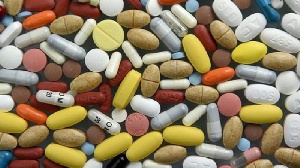 File photo : The technology will enable consumers to identify fake and unregistered drugs
File photo : The technology will enable consumers to identify fake and unregistered drugs
Starting in the third quarter of this year, the Food and Drugs Authority (FDA) will be rolling out a technology that will enable consumers to determine fake and unregistered drugs on the market, the CEO of FDA, Delese Darko, has announced.
“Already, the FDA uses a device called the ‘true scan’; and through the help of donor agencies like DfID we have been able to acquire quite a few. Now, what this device does is that you pick it up and you pick up a product [a drug or medicine] and put it in the device. It can tell you immediately the quality of the medicine, which is the problem that we tend to have – fake medicines and substandard medicines. Then, we have our own reporting channels as well; you hear us saying report to this number or call us…we think that is not enough.
“So, by third quarter we are putting in a technology that will allow you to get to us immediately with your mobile phone as to whether or not the product is registered or whether it is unregistered and we will be able to get back to you in the same way,” she told B&FT during an interview on the margins of a training workshop on Pharmaceutical Crime Investigations and Intelligence in Accra.
According to her, the technology may be in the form of an app but they are still exploring various ways to implement it.
The Pharmaceutical Crime investigations and Intelligence training is a five-day programme on strategies to combat pharmaceutical crime.
Ms Darko maintained that the evils of pharmaceutical crime have become a global phenomenon, which poses a major threat to public health, security and economies of countries.
“Production and trafficking of falsified medicines is a multi-billion illegal business, which is sustained largely by the lure of high financial gains combined with the perceived low risk of detection.”
The FDA boss also explained that, in addition, the leniency of penalties makes the trade in falsified medicines attractive to unauthorised dealers and possibly criminal groups.
According to her, in the course of its market surveillance activities nationwide, the FDA has detected the distribution of falsified versions of anthelmintics, antimalarials, antibiotics, analgesics, codeine-containing cough mixtures and controlled substances like Tramadol and diazepam – mostly from the far-east countries.
It has also detected large quantities of aphrodisiacs with unknown content and undetermined origin.
The market surveillance activities have resulted in the seizure of these products from the supply chain.
The alarming phenomenon of Tramadol abuse all over the continent has become an issue of great concern to the nation.
She said addressing this danger effectively will require multi-sectoral cooperation, including Security Agencies, Judiciary, Attorney General’s Department, Pharmacy Council, Narcotic Control Board, Ghana Education Service, National Commission on Civic Education, National Road Safety Commission, Medical and Dental Council, Pharmaceutical Society of Ghana, among others.
The training workshop is under the auspices of the Department for International Development (DFID) of the United Kingdom and involves agencies such as the Economic and Organised Crime Office (EOCO), Judiciary, Police and others.
It is the second in a series of such programmes the FDA plans to organise, and the training has the objective of equipping participants with skills in modern trends of Pharmaceutical Crime investigations, intelligence and also handling of evidence.